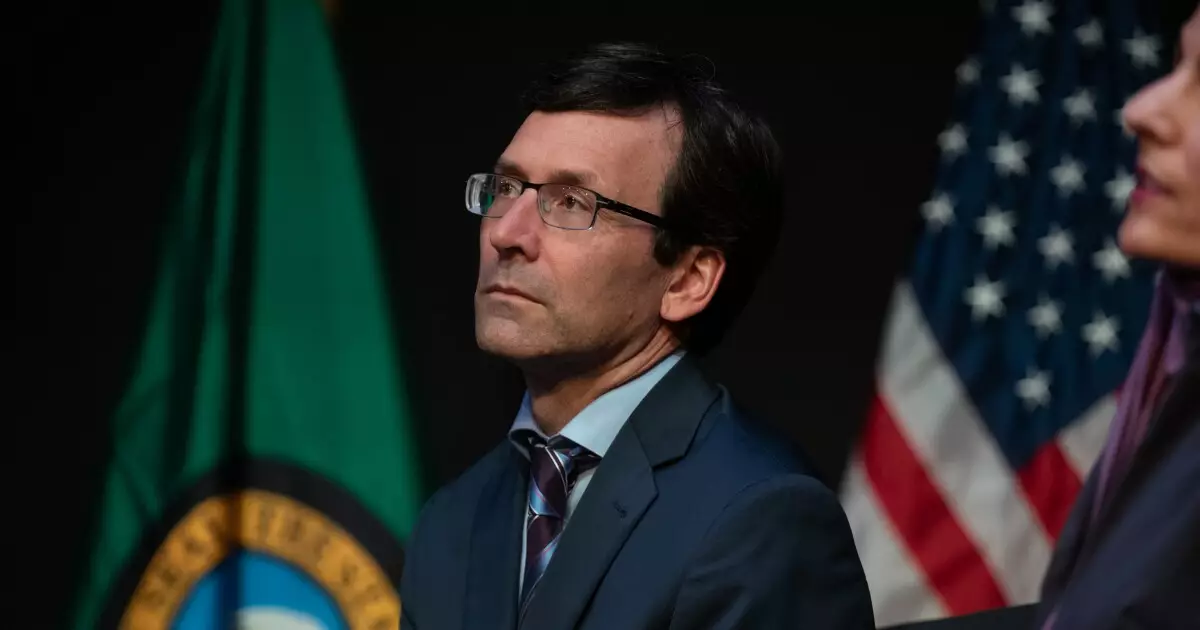The recent proceedings in Washington State’s legislature have unfolded like a political thriller, with moments of triumph quickly devolving into chaos. After the House and Senate’s joint approval of their operating budget, Governor Bob Ferguson’s swift rebuttal sent legislators scrambling to revise their plans. Far from a typical budgetary cycle, this scenario reflects an underlying turbulence fueled by both rising deficits and the specter of federal funding cuts. The fact that the legislators were caught off-guard by Ferguson’s decisive stance raises critical questions about their preparedness to govern effectively during such economically volatile times.
The governor was clear in his criticism of the proposed budgets, specifically targeting their reliance on a novel wealth tax—a strategy laden with complications and potential legal challenges. This reluctance to adopt proposed tax mechanisms points to an essential belief: that the tax structure should not only be sustainable but also align with a more conservative fiscal approach. With a projected deficit spiraling to a jaw-dropping $16 billion over the next four years, one must ask whether the legislature is truly equipped to make the difficult, pragmatic decisions required to navigate this financial storm.
The 28% Dependency: A Wake-Up Call
A staggering 28% of Washington’s budget is sustained via federal funding, amounting to approximately $43 billion biannually. These figures are alarming, especially in light of the unpredictability associated with federal contributions. This dependency poses an existential threat to the state’s financial future. Governor Ferguson’s characterization of this situation as a “five-alarm fire” isn’t just hyperbole; it reflects an urgent call for legislators to engage in serious re-evaluation of their budgetary priorities.
The implications are clear: relying heavily on external sources can lead to significant jeopardy. Given the current climate of federal budget instability, this situation should serve as a clarion call for lawmakers to pivot toward self-sufficiency. Instead of leaning on federally allocated funds, Washington should fortify its revenue streams and develop a sustainable financial model that protects essential services without placing unmanageable burdens on taxpayers.
The Rainy-Day Fund: An Essential Shield
Ferguson’s prioritization of preserving the rainy-day fund highlights a pragmatic approach toward fiscal stewardship. In a political landscape ripe with calls for expanded spending, his insistence on maintaining reserves showcases a level of responsibility often overlooked in legislative discourse. The “drain the reserves” mentality prevalent among some lawmakers ignores the basic principle of financial prudence: preparation is key to weathering economic downturns, natural disasters, and other unforeseeable challenges.
The state’s triple-A bond rating, which facilitates lower borrowing costs, is a critical asset that Ferguson is keenly aware of. Decimating this financial safety net could lead to long-term repercussions that extend far beyond this budget cycle, impairing Washington’s capacity to invest in crucial infrastructure, education, and emergency response systems. By prioritizing the preservation of reserves over expansive new budgets, lawmakers can not only protect current assets but secure a brighter, more secure economic future.
Essential Services at Risk
In Ferguson’s attempts to navigate the treacherous waters of financial governance, he has boldly rejected both extremes: an “all cuts” budget and a tax-heavy fiscal plan. This cautious middle path is laudable yet fraught with challenges. It acknowledges that essential services—particularly in health care and education—cannot withstand further cuts without significant detrimental effects.
Legislators need to grapple with the realities of their decisions as they face a projected deficit. History teaches us that slashing funding indiscriminately leads to chaos; hospitals are already cutting staff due to dwindling federal support. As Ferguson points out, the focus must shift to sustainability rather than expansive promises. Finding a balance between fiscal responsibility and providing vital services will be the cornerstone of any viable budgetary solution.
The Role of Proposition in a Shifting Landscape
As we navigate this multifaceted budget crisis, the ideological divisions within Washington’s political realm become more pronounced. Promoting a conservative approach rooted in realism rather than idealism is crucial. Proposing a wealth tax without thorough groundwork not only invites legal disputes but also demonstrates a fundamental misunderstanding of effective governance.
The path forward requires collaboration grounded in feasible proposals, honest assessments of income, and carefully considered budgets that reflect the actual capabilities of the state. The stakes are high; how Washington’s leaders respond to this budgetary crisis could redefine the state’s financial landscape for generations.

